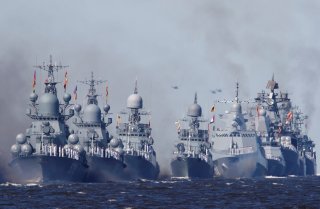Could Russia Have Sunk Britain's Destroyer Without Provoking a War? Putin Thinks So.
The Kremlin is seemingly open to launching preventative strikes against NATO assets within Russia’s maritime boundaries, based on the calculation that the west will shirk from escalating the incident into a full-scale global conflict.
Earlier this week, Russian President Vladimir Putin took part in his traditional call-in show on Russian state television. In an annual event dubbed “Direct Line,” Putin spent over four hours fielding questions submitted by Russian citizens. As with past editions of “Direct Line,” the vast majority of questions touched on domestic policy and social concerns; this year, the bulk of the discussion centered on the government’s efforts to contain the third wave of Covid-19 infections that has been roiling Russia since the beginning of June. Only a small portion of Putin’s marathon Q&A session touched on foreign policy, but it is those brief parts of the event that quickly made international headlines.
One of the co-hosts, Yekaterina Berezovskaya, queried Putin on the recent incursion of Britain’s Type 45 Destroyer HMS Defender three kilometers into Russia’s claimed territorial waters off the Crimean coast. “Do you think the world was on the brink of a Third World War?” she asked.
“This was apparently a provocation; it was obvious that it was a provocation,” Putin responded. Putin added that it was a “comprehensive provocation,” allegedly conducted not just by the British but also by U.S. reconnaissance planes operating out of Greece. “With the help of the reconnaissance aircraft they were trying to identify how we operated, and where things were located and how they operated,” he noted.
Putin expressed frustration that this alleged “provocation” was staged shortly following the Geneva Summit between him and President Joe Biden: “Why was there such a provocation? What was all of that for? For the sake of emphasizing that these people do not respect the Crimeans’ choice to join the Russian Federation? Is there something they do not understand there? Fine, keep not accepting it. But why a provocation of this kind?”
Russia annexed Crimea shortly following the 2014 Euromaidan revolution, but the territory remains internationally recognized as part of Ukraine.
Not yet content to move on, co-host Nailya Asker-Zade posed a follow-up relating to the ongoing Seabreeze drills between NATO forces and Ukraine: “Maybe NATO is teasing us? The Sea Breeze exercise is underway now, and yesterday there was a Dutch frigate.” Putin offered a stark response: “You said that this put the world on the brink of a global war. No, of course, not. Even if we had sunk that ship, it is nevertheless difficult to imagine that this would have put the world on the brink of a third world war because those who did this know they could not win a war like that. This is very important.”
There are two overlapping ways to interpret this remarkable statement. First, this could be nothing more or less than a threat to discourage further NATO and Ukrainian incursions into Russia’s claimed territorial waters. But, if this reply is to be taken at face value, Putin apparently believes that London and NATO would not have retaliated in a full military sense if the Black Sea Fleet had opted to sink the HMS Defender instead of merely firing warning shots to chase it away. To the extent that this is an accurate reflection of Russian risk assessment, the military implications are immense: the Kremlin is seemingly open to launching preventative strikes against NATO assets within Russia’s maritime boundaries, based on the calculation that the west will shirk from escalating the incident into a full-scale global conflict.
Putin proceeded to drive the point home, reiterating his longstanding position that NATO’s expansion poses an existential threat to Russia: “I do not think that we would have been happy at the turn of events you mentioned, but we at least know what we are fighting for: we are fighting for ourselves and our future on our own territory. It was not us who covered thousands of kilometers by air and sea towards them; it was them who approached our borders and entered our territorial sea, which is a crucial component in the overall situation.”
Mark Episkopos is a national security reporter for The National Interest.
Image: Reuters

